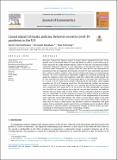Causal impact of masks, policies, behavior on early covid-19 pandemic in the U.S.
Author(s)
Chernozhukov, Victor V; Kasahara, Hiroyuki; Schrimpf, Paul
DownloadPublished version (25.80Mb)
Publisher with Creative Commons License
Publisher with Creative Commons License
Creative Commons Attribution
Terms of use
Metadata
Show full item recordAbstract
The paper evaluates the dynamic impact of various policies adopted by US states on the growth rates of confirmed Covid-19 cases and deaths as well as social distancing behavior measured by Google Mobility Reports, where we take into consideration people's voluntarily behavioral response to new information of transmission risks in a causal structural model framework. Our analysis finds that both policies and information on transmission risks are important determinants of Covid-19 cases and deaths and shows that a change in policies explains a large fraction of observed changes in social distancing behavior. Our main counterfactual experiments suggest that nationally mandating face masks for employees early in the pandemic could have reduced the weekly growth rate of cases and deaths by more than 10 percentage points in late April and could have led to as much as 19 to 47 percent less deaths nationally by the end of May, which roughly translates into 19 to 47 thousand saved lives. We also find that, without stay-at-home orders, cases would have been larger by 6 to 63 percent and without business closures, cases would have been larger by 17 to 78 percent. We find considerable uncertainty over the effects of school closures due to lack of cross-sectional variation; we could not robustly rule out either large or small effects. Overall, substantial declines in growth rates are attributable to private behavioral response, but policies played an important role as well. We also carry out sensitivity analyses to find neighborhoods of the models under which the results hold robustly: the results on mask policies appear to be much more robust than the results on business closures and stay-at-home orders. Finally, we stress that our study is observational and therefore should be interpreted with great caution. From a completely agnostic point of view, our findings uncover predictive effects (association) of observed policies and behavioral changes on future health outcomes, controlling for informational and other confounding variables.
Date issued
2021-01Department
Massachusetts Institute of Technology. Department of EconomicsJournal
Journal of Econometrics
Publisher
Elsevier BV
Citation
Chernozhukov, Victor et al. "Causal impact of masks, policies, behavior on early covid-19 pandemic in the U.S." Journal of Econometrics 220, 1 (January 2021): 23-62 © 2020 The Author(s)
Version: Final published version
ISSN
0304-4076